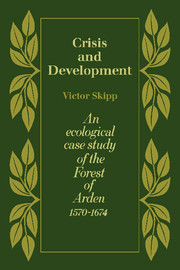Book contents
- Frontmatter
- Contents
- List of figures
- List of tables
- Acknowledgements
- PART ONE THE CONTEXT
- PART TWO THE CASE STUDY
- 4 The demographic crisis of 1613–19
- 5 Negative responses
- 6 The ecological problem
- 7 Positive responses: agrarian change
- 8 Positive responses: new employment openings
- 9 Model of demographic, economic and social developments, 1575–1649
- 10 The new ecological regime, 1625–74
- 11 The social cost
- PART THREE IMPLICATIONS
- Appendix 1 The practice of birth control
- Appendix II Estimates of population size
- Notes
- Index
5 - Negative responses
Published online by Cambridge University Press: 05 November 2011
- Frontmatter
- Contents
- List of figures
- List of tables
- Acknowledgements
- PART ONE THE CONTEXT
- PART TWO THE CASE STUDY
- 4 The demographic crisis of 1613–19
- 5 Negative responses
- 6 The ecological problem
- 7 Positive responses: agrarian change
- 8 Positive responses: new employment openings
- 9 Model of demographic, economic and social developments, 1575–1649
- 10 The new ecological regime, 1625–74
- 11 The social cost
- PART THREE IMPLICATIONS
- Appendix 1 The practice of birth control
- Appendix II Estimates of population size
- Notes
- Index
Summary
So far it has been argued that rapid demographic increase in the last quarter of the sixteenth century and early seventeenth century led to a state of ‘ecological disequilibrium’ in northern Arden, i.e., a serious imbalance between population and resources; and that, as a result, in the 1610s there was a mild Malthusian check on population growth. Immediately prior to this check the population of the five parishes had probably been somewhere in the region of 3,100. But the ‘seven lean years’ brought a reduction which was perhaps in the order of 10%. Certainly, the Cox estimate for the 1620s works out at 2,840, or over 8% below the analogous figure for the 1600s. However, the fact that by 1640 the parishes had taken their combined total up to something like 3,400 – i.e., well beyond the pre-crisis figure – suggests that the underlying ecological difficulties must have been countered in some way. How then, did these Arden communities manage eventually to accommodate the extra numbers?
To begin with, certain negative responses can be isolated, through which the ecosystem was indicating, as it were, that such high numbers could not be supported. The first such response was of course the Malthusian check itself, as represented by the 1613–19 crisis. However, from the ecological point of view, and in a seventeenth-century context, this involuntary emetic may be regarded as having made its own contribution to the eventual solution. For, by significantly reducing numbers, it helped to trim the problem to size.
- Type
- Chapter
- Information
- Crisis and DevelopmentAn Ecological Case Study of the Forest of Arden 1570–1674, pp. 39 - 40Publisher: Cambridge University PressPrint publication year: 1978
- 1
- Cited by



